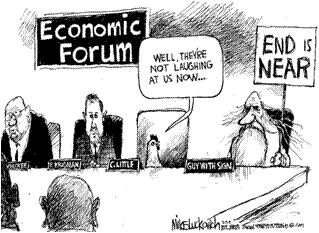
So what if I'm wrong? Where could this go? First, it's important to understand that we'll come out of this with a new paradigm. This won't be a typical recession/recovery pattern. That's why those experts who try to identify an ever lower bottom target will be at worst completely wrong and at best completely misleading. This economic event is a game changer. It's not like anything that we've experienced in the past, so historical metrics like trough Price/Earnings and Price/Book are pretty much meaningless. Jeff Jarvis takes a good first stab at what the other side of this crisis could look like in The Great Restructuring.
Secondly, the market is constrained by some ultimate bottom that's greater than zero. It obviously wasn't S&P 800 or 700, but the stocks in the index have some real value that's supported by real assets: property, inventory, receivables, and real cash on the balance sheet, to say nothing of brand equity and goodwill. We can debate the value of those assets, but it's a real number. Maybe you'd rather have a dollar's worth of gold than a dollar's worth of Procter&Gamble stock, but would you prefer the dollar of gold to ten dollars worth of downtown
Then what are the outcomes that would prove me totally incorrect? It seems to me that there are two: Obviously the first is Financial Armegeddon-- a complete meltdown of the system. It could happen, and if it did we're all screwed. Sure, you could bring your gold coins to the supermarket to exchange for meat and bread, but what makes you think meat and bread would be available even to exchange for gold? It could happen, but it's tough to hedge and will produce an unhappy outcome even for the bears.
Second is the prolonged recession. If it lasts more than four years, I'm completely wrong. Media Star Nouriel Roubini predicts the L shaped recession: down and staying down. In that circumstance, Treasury notes might do well, but they might not. Stocks would probably exhibit basing behavior with limited further declines. Treasuries would do well initially but ultimately be decimated by oversupply and currency debasement. This one is somewhat more likely, but if it happens I think that my portfolio of high quality dividend paying stocks will hold up as well as anything.
Finally, I need to allow for the unknown and unanalyzable. Intelligent investors must make allowances for their own shortcomings. The economy is an incredibly complex mechanism, and merely to guess correctly on one or two aspects scarcely guarantees an accurate overall assessment. Peter Schiff absolutely nailed the risk in housing, but his hedge fund was a poor performer because he incorrectly extrapolated the impact on the dollar. Kyle Bass is a very smart guy and he couldn't have been more right about the worldwide economic collapse, but his fund was only up 6% in 2008-- better than most, but not the type of home run that investors probably expected given his boldly bearish predictions.
I believe that the current economic crisis will be well on its way to being resolved sometime in 2010. I don't know where the market will go in the near term. But my core belief is that good quality stocks purchased today will produce substantial returns-- doubles or more-- in three to four years.
Portfolio Update
I have a full position in Google, my largest holding, so I won't be buying more. However, I believe that under 300 it's an extremely attractive investment opportunity.





No comments:
Post a Comment